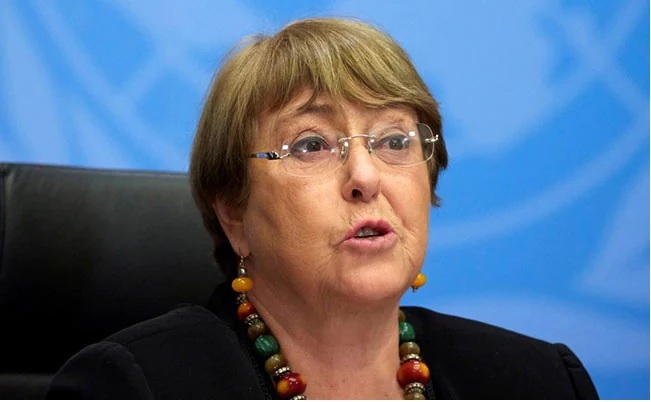China “pressuring” UN rights chief to bury Xinjiang report

China circulated a letter urging UN High Commissioner for Human Rights Michelle Bachelet to bury her highly anticipated report on human rights violations in Xinjiang, s according to UK-based media, and Australian publication, Sydney Morning Herald.
 Faced with criticism after her China visit, Michelle Bachelet has pledged to publish a report into Xinjiang before she leaves office on August 31.
Faced with criticism after her China visit, Michelle Bachelet has pledged to publish a report into Xinjiang before she leaves office on August 31.
The letter authored by China expressed “grave concern” about the Xinjiang report and aims to halt its release, said four sources – the three diplomats and a rights expert who all spoke on condition of anonymity. They said China began circulating it among diplomatic missions in Geneva from late June and asked countries to sign it to show their support, according to SMH report.
Diplomats of three countries have confirmed the ”news”. It is said Cina has been urging to bury the report among diplomatic missions in Geneva since late June..
Critics accuse Bachelet for being too soft on China during a May visit in what could have been a golden chance to investigate the human rights situation in Xinjiang and Tibet and to hold Beijing accountable for its abuses against Uyghurs and Tibetans, but it seems that the first visit of the rights body chief turned out to be a “wasted historic opportunity”, says Beijing Bulletin.
The first visit of a UN Chief in 17 years to China has made the world question the role of the United Nations in this era and the extent of influence China holds in twisting opinions and moulding narratives.
But she has pledged to publish a report into Xinjiang before she leaves office on August 31
The Global Times reported that the statement by the UN rights chief at the end of her trip stressed that her trip was not an “investigation” and that this was “an opportunity to hold direct discussions – with China’s most senior leaders” on areas including “human rights” “was a slap to the Western countries”.
Bachelet provided no transparency about her six-day trip to China. Her prison visit in Xinjiang was a “Potemkin-style sham,” said Radio Free Asia (RFA) citing the Washington-based Campaign for Uyghurs.
“The assessment, if published, will intensify politicisation and bloc confrontation in the area of human rights, undermine the credibility of the OHCHR [Office of the High Commissioner for Human Rights], and harm the cooperation between OHCHR and member states,” the letter said, referring to Bachelet’s office.
“We strongly urge Madame High Commissioner not to publish such an assessment.”
“The high commissioner has disgraced herself and her office by refusing to investigate China’s genocide and adopting, repeating the Chinese regime’s narrative, further cementing their propaganda in the UN,” Rushan Abbas, the organization’s executive director, told RFA.
“Her comments seem custom-made for Beijing’s propaganda machine, and she neglects the duties of her office and the founding principle of the UN,” Abbas said.
The World Uyghur Congress (WUC) strongly urged her office to release her independent assessment of the situation, as a show of willingness to hold the Chinese government accountable for crimes against humanity and genocide being committed.
The International Campaign for Tibet (ICT) also expressed disappointment with the Bachelet’s visit to China, saying this trip has given a “political victory” to the Communist regime.
According to the Tibetan group, the UN rights chief adopted the Chinese Communist Party’s framing of policies, domestically and internationally.
Liu Yuyin, a spokesperson for China’s diplomatic mission in Geneva, did not say whether the letter had been sent nor responded to questions about its contents.
Liu said that nearly 100 countries had recently expressed their support for China on Xinjiang-related issues “and their objection to interference in China’s internal affairs under the pretext of human rights”.
This support was voiced through public statements at the last UN Human Rights Council session, which ended on July 8, and through the “joint letter”, Liu added, using a term denoting China and the other signatories.
It was not clear whether Bachelet had received the letter; OHCHR spokesperson declined to comment on the matter, according to Reuters
-
Book Shelf
-
 Book Review
DESTINY OF A DYSFUNCTIONAL NUCLEAR STATE
Book Review
DESTINY OF A DYSFUNCTIONAL NUCLEAR STATE
- Book ReviewChina FO Presser Where is the fountainhead of jihad?
- Book ReviewNews Pak Syndrome bedevils Indo-Bangla ties
- Book Review Understanding Vedic Equality….: Book Review
- Book Review Buddhism Made Easy: Book Review
- Book ReviewNews Elegant Summary Of Krishnamurti’s teachings
- Book Review Review: Perspectives: The Timeless Way of Wisdom
- Book ReviewNews Rituals too a world of Rhythm
- Book Review Marx After Marxism
- Book Review John Updike’s Terrorist – a review
-
-
Recent Top Post
-
 Commentaries
Impasse over BRI Projects in Nepal
Commentaries
Impasse over BRI Projects in Nepal
-
 CommentariesNews
Yet another Musical Chairs in Kathmandu
CommentariesNews
Yet another Musical Chairs in Kathmandu
-
 CommentariesTop Story
Spurt in Anti-India Activities in Canada
CommentariesTop Story
Spurt in Anti-India Activities in Canada
-
 NewsTop Story
Nepal: Political Stability Under Threat Again
NewsTop Story
Nepal: Political Stability Under Threat Again
-
 NewsTop Story
Accountability Tryst With 2024 Ballot….
NewsTop Story
Accountability Tryst With 2024 Ballot….
-
 NewsTop Story
What Would “Total Victory” Mean in Gaza?
NewsTop Story
What Would “Total Victory” Mean in Gaza?
-
 CommentariesTop Story
The Occupation of Territory in War
CommentariesTop Story
The Occupation of Territory in War
-
 CommentariesTop Story
Pakistan: Infighting in ruling elite intensifies following shock election result
CommentariesTop Story
Pakistan: Infighting in ruling elite intensifies following shock election result
-
 CommentariesTop Story
Proforma Polls in Pakistan Today
CommentariesTop Story
Proforma Polls in Pakistan Today
-
 CommentariesTop Story
Global South Dithering Away from BRI
CommentariesTop Story
Global South Dithering Away from BRI
-
AdSense code



















